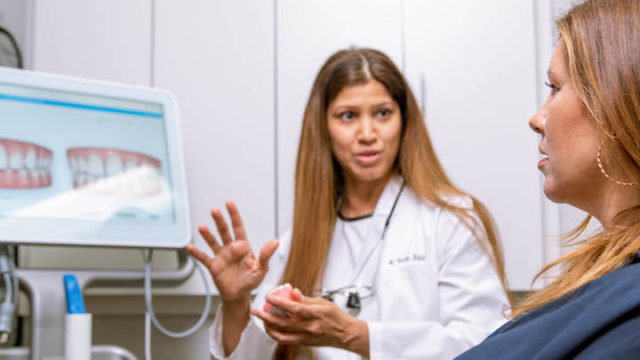
It’s easy to get in the rhythm of attending your six-month dental check-up without asking any questions. You get a thorough teeth cleaning, exchange a little light banter with your dental team, and then go about your day. Continuing that routine could mean you’re missing some golden opportunities to improve your oral health.
Communication with all health professionals in your life is the best way to stay on top of your overall health. Since dental health is so closely tied to the rest of your body, it’s important to discuss any concerns with your dentist. Try covering these ten questions at your next dental visit to get the conversation going.
1. How is My Dental Health?
This question may be the biggest one to ask your dental team. Let them know if you have concerns. Don’t forget to ask about things like bone density and teeth grinding. If nothing else, this question opens conversation and sets up the rest of this list.
2. Should I Be Concerned About Any Dental Issues?
Your dentist may ask about your family history regarding conditions like gum disease and tooth loss. It’s an excellent opportunity to discuss your concerns and any underlying health conditions that could impact your oral health. Make sure you ask about specific concerns you have.
- Are there any indications of gum disease?
- What are the signs and symptoms of gum disease?
- Do any of my teeth feel loose?
- Are there any problem areas that I should pay more attention to?
Your dentist may indicate some puffy spots along your gums or suggest adjusting your daily oral care routine as a preventative measure.
3. How Can I Improve My Oral Health?
Brushing and flossing daily isn’t the only way to care for your teeth and gums. Asking this question means addressing potential dental issues and could involve altering your diet, switching the dental tools you use, or even considering additional treatments.
4. Do You Have Tips for Improving My Oral Care Routine?
You can certainly break this question down into bite-sized portions or get more specific, but we can all improve our oral care routine. Maybe switching toothbrushes or toothpaste, adding a mouthwash, or adjusting your technique could make a difference in your overall oral health.
5. Do I Need Teeth Whitening?
If you don’t love the color of your teeth, you may want to ask if teeth whitening treatment could help. Don’t forget to ask about the best products to use or if your dentist offers a specific teeth whitening treatment.
6. Would Orthodontics Improve My Smile?
From slightly crooked teeth to bite issues, orthodontics can work wonders on a smile. Whether you’ve considered it before or not, your dentist can make recommendations and refer you to an orthodontist for a consultation.
If you’d like to schedule a free orthodontic consultation, we’re happy to help! Simply book an appointment online.
7. Are There Any Foods or Drinks I Should Avoid?
Your dentist may have recommendations about alterations to your diet that could impact your oral health. Even if you know about foods and drinks that stain or weaken your teeth, your dentist may have specific suggestions for you based on what they see. Don’t forget to ask about foods that can help your teeth!
8. Why Are My Teeth Sensitive?
If you experience sensitivity, even if it’s intermittent, speak to your dentist at your next preventative care check-up. Experiencing sensitivity, even if it’s not constant, could indicate an underlying issue that your dentist can investigate. It’s better to catch things as early as possible, and that means asking the right questions.
9. What is Causing My Tooth Pain?
As with tooth sensitivity, pain can indicate a dental issue. Even if it doesn’t bother you when you’re at the dental office, it’s important to mention any issues with pain so that your dentist has all of the information to address your oral care.
10. Do You See Any Issues I Need to Discuss with My Primary Care Doctor?
Since many physical conditions cause problems with your teeth and gums, your dentist may see signs of trouble before your primary care physician. Some medications can affect your teeth and may require adjustments to preserve your oral health. Your dentist can alert you to potential concerns.
You may also want to ask if your family doctor could provide valuable information to your dentist to help with your treatment plan. Medications, vitamin deficiencies, and some conditions (like diabetes) can affect your teeth. That knowledge may alter your dental treatment plan and could help your dentist treat you in emergency dental situations.
If you’re due for a check-up or want to ask a dentist questions about your oral health, Jefferson Dental & Orthodontics can help. Book an appointment online so you can review all these topics with a friendly dentist near you!




